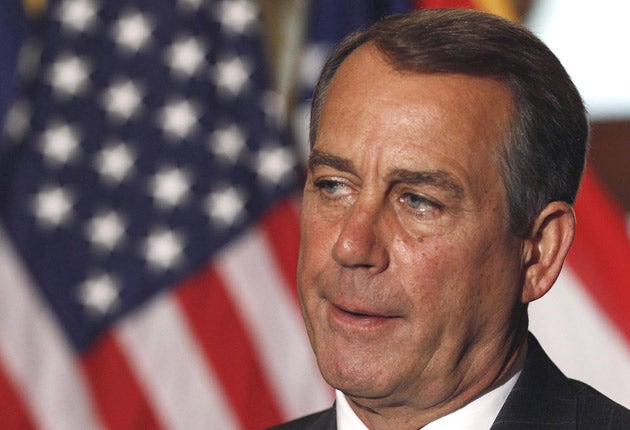Tea Party budget demands could force US government shutdown

Party leaders on Capitol Hill are racing to overcome an impasse in budget talks that is threatening a partial shutdown of the United States government. If no solution is found, hundreds of thousands of federal workers will become idle and facilities as varied as zoos, museums and passport offices will close temporarily.
After President Barack Obama told negotiators to "act like grown-ups" and get over their differences, hopes of a solution were still flickering last night. If they fail to set spending levels for the remainder of the fiscal year, which ends on 30 September, the shutdown will begin at midnight on Friday.
The last such shutdown came in 1996 when Bill Clinton was in the White House. The stoppage lasted three weeks and in the end brought public wrath on then Republican House Speaker, Newt Gingrich. Centre-stage this time is Representative John Boehner, who became Speaker after Republicans retook control of the House in last year's midterm elections. Mr Boehner is under pressure from his newly elected Tea Party caucus to win swingeing cuts not just in spending but in the size of government itself.
After hopes that a compromise would be reached involving cuts of $33bn this year, Mr Boehner dismayed Democrats by suggesting during talks at the White House that he wanted to strip out another $7bn. "Every time we agree to meet in the middle they move where the middle is," Harry Reid, the Democrat majority leader in the Senate, complained yesterday. "We stand here with fewer than 72 hours on the clock... It's time to get the job done."
Officials in Washington were already scrambling to prepare for a possible shutdown, which would cause widespread disruption and, if it becomes protracted, could endanger the fragile economic recovery. Non-essential government staff would be asked to stay at home. Government workers expecting to take paid leave would no longer be able to. It would be illegal for federal workers to use government- issued BlackBerry devices. National parks such as Yellowstone and the Statue of Liberty would be closed.
Essential government services, such as defence, air traffic control and the FBI, would not be affected but scores of federally funded programmes would come to a halt. Police trainers in Afghanistan would come home, while passport and visa processing offices would close. There is also concern that there would eventually be an interruption in unemployment benefit payments.
Even if a last-minute deal is reached – and Congress has a history of pulling back from the brink – the fight between the parties over levels of government spending will be far from over. Polls show that most Americans share alarm about a federal deficit that has now reached roughly $1.5 trillion.
Join our commenting forum
Join thought-provoking conversations, follow other Independent readers and see their replies
Comments
Bookmark popover
Removed from bookmarks